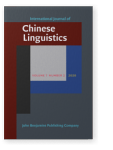Vol. 7:2 (2020) ► pp.167–186
Revisiting donkey anaphora in Mandarin Chinese
A reply to Pan and Jiang (2015)
In their article published in this journal, Pan and Jiang (2015) challenge the claims and proposals made in Cheng and Huang (1996) concerning both the distributional patterns and interpretive strategies for donkey anaphora in Mandarin conditional. They claim that all three types of conditionals (rúguǒ-, dōu- and bare conditionals) allow either a wh-phrase or a pronoun in the consequent clause, and that both the wh-phrase and the pronoun may be either unselectively bound or interpreted by the E-type strategy. We show that, except for an observation already mentioned and accommodated in Cheng and Huang’s (1996) analysis of rúguǒ-conditionals, their distributional claims are incorrect. It is also shown that the interpretative flexibility they propose is untenable, as it leaves a number of otherwise well-predicted properties unaccounted for.
Article outline
- 1.Introduction
- 2.The distributional patterns
- 2.1 Cheng and Huang (1996)
- 2.2 Pan and Jiang (2015)
- 3.Dissecting P&J’s patterns
- 3.1 Rúguǒ-conditionals
- 3.2 Dōu-conditionals
- 3.3Bare conditionals
- 4.Interpreting wh-phrases and pronouns
- 4.1Interpreting wh-phrases
- 4.2Interpreting pronouns
- 5.Conclusion
- Acknowledgements
- Notes
-
References
